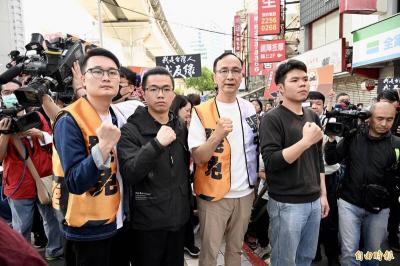Calling for higher-quality news coverage, media representatives yesterday decried the rumor-based reporting methods that have recently become more common, especially allegations made against government officials without solid proof.
Connie Lin (
Politicians have taken a liking to "soap opera" style revelations, feeding information to reporters whenever they want and reminding the public to wait for the next "episode" or disclosure, Lin said.
The media has become a tool of these politicians, she said.
Chuan Po-chung (
"Some `scandal revealers' can be trusted while many others cannot. The media must be able to tell the difference," Chuan said.
Information from a text message or an anonymous tipster is not always accurate, he said, and if such rumors are reported, the media's job is to do a thorough follow-up to see if the rumors are true or false.
Lu Shih-hsiang (
"When one dog barks, all the others bark too, without knowing the reason," Lu said.
"It's unbelievably basic, but the media forgets that they cannot `bark' without knowing the evidence," he said.
The media should refuse to become rumormongers, Lu said.
Political commentator Chien Yu-yen (
"It's not that we reporters don't have consciences," Chien said. "The whole system is problematic. We have to report scandalous rumors because if we don't, our jobs are on the line."
Yu Ying-fu (尤英夫), an attorney specializing in media law, reminded journalists that people targeted by rumors or caught up in scandals are "innocent till proven guilty."
"The media cannot presuppose that they know everything and that they can reach the verdict on their own," Yu said.
Yu said that according to Article 23 of the Broadcasting and Television Law (廣電法), if a person feels that a television station broadcast erroneous information about them, they are entitled to an opportunity to clarify and defend themselves on the same station within 15 days.
A TV station has to respond to the person's request for clarification and defense within seven days.
However, Yu said, he urges victims to sue because the law is on their side.
Lin said the media should apologize after false information has been reported and that it should remember the social responsibilities it has.
"The media needs to remember to do reports based on evidence, not guesswork," she said.

The Ministry of Economic Affairs has fined Taobao NT$1.2 million (US$36,900) for advertisements that exceeded its approved business scope and ordered the Chinese e-commerce platform to make corrections in the first half of this year or its license would be revoked. Lawmakers have called for stricter supervision of Chinese e-commerce platforms and more stringent measures to prevent China from laundering its goods through Taiwan as US President Donald Trump’s administration cracks down on origin laundering. The legislature’s Finance Committee yesterday met to discuss policies to prevent China from dumping goods in Taiwan, inviting government agencies to report on the matter. Democratic Progressive Party

Taiwan and its Pacific ally Tuvalu on Tuesday signed two accords aimed at facilitating bilateral cooperation on labor affairs, according to Taiwan’s Ministry of Foreign Affairs (MOFA). The governments inked two agreements in Taipei, witnessed by Foreign Minister Lin Chia-lung (林佳龍) and visiting Deputy Tuvaluan Prime Minister Panapasi Nelesone, MOFA said in a news release. According to MOFA, the agreements will facilitate cooperation on labor issues and allow the two sides to mutually recognize seafarers’ certificates and related training. Taiwan would also continue to collaborate with Tuvalu across various fields to promote economic prosperity as well as the well-being of their

The Taipei District Prosecutors’ Office has continued its investigation into allegations of forged signatures in recall efforts today by searching the Chinese Nationalist Party’s (KMT) city chapter and questioning several personnel including the chapter director, according to media reports. Among those questioned and detained were KMT Taipei chapter director Huang Lu Chin-ju (黃呂錦茹), chapter secretary-general Chu Wen-ching (初文卿), chapter secretary Yao Fu-wen (姚富文) and first district committee executive director Tseng Fan-chuan (曾繁川). Prosecutors said they would not confirm reports about who had been summoned. The investigation centers on allegations that the ongoing recall campaigns targeting Democratic Progressive Party legislators Rosalia Wu (吳思瑤)

Several Chinese Nationalist Party (KMT) officials including Chairman Eric Chu (朱立倫) are to be summoned for questioning and then transferred to prosecutors for holding an illegal assembly in Taipei last night, the Taipei Police said today. Chu and two others hosted an illegal assembly and are to be requested to explain their actions, the Taipei City Police Department's Zhongzheng (中正) First Precinct said, referring to a protest held after Huang Lu Chin-ju (黃呂錦茹), KMT Taipei's chapter director, and several other KMT staffers were questioned for alleged signature forgery in recall petitions against Democratic Progressive Party (DPP) legislators. Taipei prosecutors had filed